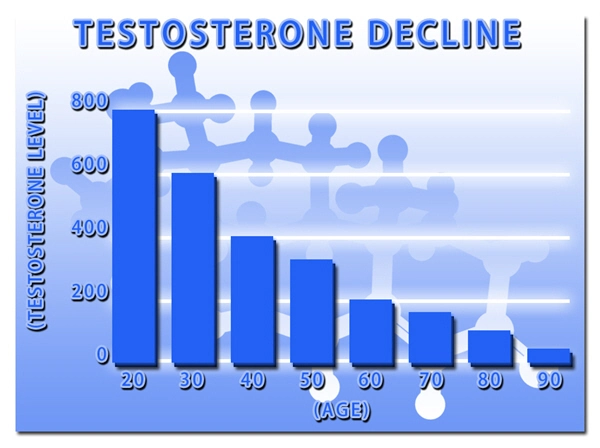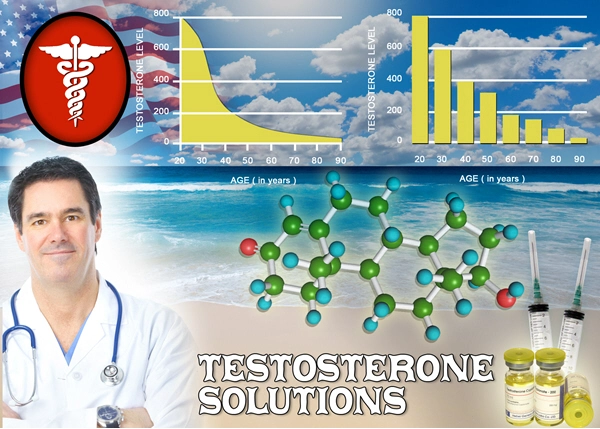Introduction
Testosterone, the primary male sex hormone, plays a crucial role in various physiological processes, including the regulation of red blood cell production. Recent studies have begun to explore the potential link between low testosterone levels and the increased risk of hematological disorders in American men. This article delves into the current understanding of this association, its implications, and the importance of monitoring testosterone levels for overall health.
The Role of Testosterone in Hematopoiesis
Testosterone influences hematopoiesis, the process of blood cell formation, primarily by stimulating erythropoiesis, the production of red blood cells. This hormone enhances the production of erythropoietin, a key regulator of red blood cell production, and directly affects the bone marrow's ability to produce these cells. Consequently, a deficiency in testosterone can lead to a decrease in red blood cell count, potentially resulting in anemia and other hematological disorders.
Epidemiological Insights
Recent epidemiological studies have highlighted a concerning trend among American men: a significant number are experiencing low testosterone levels, a condition known as hypogonadism. According to data from the National Health and Nutrition Examination Survey (NHANES), approximately 39% of men over the age of 45 have low testosterone levels. This prevalence increases with age, affecting nearly half of men over 75.
Linking Low Testosterone to Hematological Disorders
The connection between low testosterone and hematological disorders is multifaceted. Studies have shown that men with hypogonadism are at a higher risk of developing anemia, a condition characterized by a lower-than-normal number of red blood cells. This risk is particularly pronounced in older men, where the natural decline in testosterone levels exacerbates the condition.
Moreover, low testosterone has been associated with other hematological issues, such as polycythemia, a condition where the body produces too many red blood cells. While this might seem counterintuitive, the compensatory mechanisms triggered by low testosterone can lead to an overproduction of red blood cells in some individuals, increasing the risk of thrombosis and other cardiovascular complications.
Clinical Implications and Management
The clinical implications of these findings are significant. Healthcare providers should consider screening for low testosterone levels in men presenting with hematological abnormalities, particularly those with unexplained anemia or polycythemia. Early detection and management of hypogonadism can mitigate the risk of developing severe hematological disorders.
Management strategies for men with low testosterone and hematological issues may include testosterone replacement therapy (TRT). TRT can help restore normal testosterone levels, thereby improving red blood cell production and alleviating symptoms of anemia. However, it is crucial to monitor patients closely, as TRT can also lead to an increase in red blood cell count, potentially exacerbating conditions like polycythemia.
Lifestyle and Preventive Measures
In addition to medical interventions, lifestyle modifications can play a vital role in managing low testosterone and reducing the risk of hematological disorders. Regular exercise, a balanced diet rich in essential nutrients, and maintaining a healthy weight can help optimize testosterone levels. Furthermore, avoiding excessive alcohol consumption and smoking can prevent further declines in testosterone and support overall hematological health.
Conclusion
The link between low testosterone and hematological disorders in American men is a growing concern that warrants further research and clinical attention. As our understanding of this relationship deepens, it becomes increasingly important for healthcare providers to consider testosterone levels in the diagnosis and management of hematological conditions. By addressing low testosterone through a combination of medical and lifestyle interventions, we can improve the health outcomes of American men and reduce the burden of hematological disorders.

- Environmental Toxins Linked to Declining Testosterone Levels in American Men [Last Updated On: March 4th, 2025] [Originally Added On: March 4th, 2025]
- Economic Burden of Low Testosterone on American Healthcare System [Last Updated On: March 17th, 2025] [Originally Added On: March 17th, 2025]
- Vitamin D's Role in Managing Low Testosterone in American Men: Insights and Strategies [Last Updated On: March 17th, 2025] [Originally Added On: March 17th, 2025]
- Low Testosterone in American Males: Symptoms, Causes, and Management Strategies [Last Updated On: March 18th, 2025] [Originally Added On: March 18th, 2025]
- Low Testosterone and Mood Disorders in American Men: Causes, Symptoms, and Treatments [Last Updated On: March 18th, 2025] [Originally Added On: March 18th, 2025]
- Chronic Illnesses and Their Impact on Testosterone Levels in American Males [Last Updated On: March 18th, 2025] [Originally Added On: March 18th, 2025]
- Low Testosterone's Impact on Muscle Health in American Males: Causes, Effects, and Treatments [Last Updated On: March 19th, 2025] [Originally Added On: March 19th, 2025]
- Low Testosterone in American Men: Symptoms, Diagnosis, and Treatment Options [Last Updated On: March 19th, 2025] [Originally Added On: March 19th, 2025]
- Alcohol Consumption's Impact on Testosterone Levels in American Men [Last Updated On: March 20th, 2025] [Originally Added On: March 20th, 2025]
- Low Testosterone and Diabetes in American Males: Impacts and Management Strategies [Last Updated On: March 20th, 2025] [Originally Added On: March 20th, 2025]
- Low Testosterone in Aging Men: Symptoms, Impacts, and Management Strategies [Last Updated On: March 21st, 2025] [Originally Added On: March 21st, 2025]
- Low Testosterone's Impact on Cognitive Function in American Men: Memory, Attention, and Executive Skills [Last Updated On: March 21st, 2025] [Originally Added On: March 21st, 2025]
- Smoking's Impact on Testosterone: A Critical Health Concern for American Men [Last Updated On: March 21st, 2025] [Originally Added On: March 21st, 2025]
- Low Testosterone's Impact on Skin Health in American Men: Causes and Management [Last Updated On: March 21st, 2025] [Originally Added On: March 21st, 2025]
- Shift Work's Impact on Testosterone Levels in American Men: Risks and Mitigation Strategies [Last Updated On: March 22nd, 2025] [Originally Added On: March 22nd, 2025]
- Zinc's Role in Boosting Testosterone Levels in American Men: A Comprehensive Overview [Last Updated On: March 23rd, 2025] [Originally Added On: March 23rd, 2025]
- Low Testosterone and Depression in American Males: Links, Implications, and Therapy [Last Updated On: March 23rd, 2025] [Originally Added On: March 23rd, 2025]
- Low Testosterone and Hair Loss: Impact and Management in American Males [Last Updated On: March 23rd, 2025] [Originally Added On: March 23rd, 2025]
- Boosting Testosterone in American Men Through Tailored Physical Activity [Last Updated On: March 23rd, 2025] [Originally Added On: March 23rd, 2025]
- Medications Impacting Testosterone Levels: Insights for American Men's Hormonal Health [Last Updated On: March 23rd, 2025] [Originally Added On: March 23rd, 2025]
- Weight Loss: A Key Strategy for Boosting Testosterone in American Males [Last Updated On: March 23rd, 2025] [Originally Added On: March 23rd, 2025]
- Herbal Supplements: A Natural Approach to Treating Low Testosterone in American Men [Last Updated On: March 23rd, 2025] [Originally Added On: March 23rd, 2025]
- Low Testosterone Linked to Osteoporosis Risk in American Men: Prevention and Treatment Insights [Last Updated On: March 24th, 2025] [Originally Added On: March 24th, 2025]
- Low Testosterone in American Males: Impact on Libido and Treatment Options [Last Updated On: March 24th, 2025] [Originally Added On: March 24th, 2025]
- Dietary Strategies to Boost Testosterone in American Men: Key Nutrients and Foods [Last Updated On: March 24th, 2025] [Originally Added On: March 24th, 2025]
- Genetic Factors in Low Testosterone Among American Males: Research and Implications [Last Updated On: March 24th, 2025] [Originally Added On: March 24th, 2025]
- Nutritional Deficiencies and Testosterone: Insights for American Males [Last Updated On: March 24th, 2025] [Originally Added On: March 24th, 2025]
- Low Testosterone and Prostate Health: Understanding Risks and Management Strategies [Last Updated On: March 24th, 2025] [Originally Added On: March 24th, 2025]
- Environmental Estrogens: Impact on Testosterone Levels in American Males [Last Updated On: March 25th, 2025] [Originally Added On: March 25th, 2025]
- Low Testosterone and Metabolic Syndrome: Impacts and Interventions in American Men [Last Updated On: March 25th, 2025] [Originally Added On: March 25th, 2025]
- Low Testosterone: Symptoms, Diagnosis, and Impact on Men's Quality of Life [Last Updated On: March 25th, 2025] [Originally Added On: March 25th, 2025]
- Low Testosterone: Impacts and Strategies for Managing Body Composition in American Males [Last Updated On: March 25th, 2025] [Originally Added On: March 25th, 2025]
- Low Testosterone and Anemia: Exploring the Link and Treatment in American Men [Last Updated On: March 25th, 2025] [Originally Added On: March 25th, 2025]
- Low Testosterone's Impact on Emotional Health in American Men: Insights and Solutions [Last Updated On: March 25th, 2025] [Originally Added On: March 25th, 2025]
- Chronic Inflammation's Impact on Testosterone Levels in American Males [Last Updated On: March 26th, 2025] [Originally Added On: March 26th, 2025]
- Chronic Stress Impact on Testosterone Levels in American Men: Management Strategies [Last Updated On: March 26th, 2025] [Originally Added On: March 26th, 2025]
- Low Testosterone's Impact on Immune Function in American Males: Insights and Interventions [Last Updated On: March 26th, 2025] [Originally Added On: March 26th, 2025]
- Low Testosterone and Thyroid Disorders: Exploring the Link in American Men [Last Updated On: March 26th, 2025] [Originally Added On: March 26th, 2025]
- Liver Health's Crucial Role in Managing Testosterone Levels in American Males [Last Updated On: March 27th, 2025] [Originally Added On: March 27th, 2025]
- Low Testosterone Linked to Insulin Resistance in American Men: Impacts and Strategies [Last Updated On: March 27th, 2025] [Originally Added On: March 27th, 2025]
- Low Testosterone Linked to Increased Heart Disease Risk in American Men [Last Updated On: March 27th, 2025] [Originally Added On: March 27th, 2025]
- Low Testosterone and Skin Health: Impacts and Management in American Men [Last Updated On: March 27th, 2025] [Originally Added On: March 27th, 2025]
- Hormonal Imbalance and Low Testosterone in American Males: Causes, Symptoms, and Treatments [Last Updated On: March 27th, 2025] [Originally Added On: March 27th, 2025]
- Sleep Apnea's Impact on Testosterone Levels in American Males: Causes and Solutions [Last Updated On: March 27th, 2025] [Originally Added On: March 27th, 2025]
- Chronic Pain's Impact on Testosterone Levels in American Males: A Comprehensive Analysis [Last Updated On: March 28th, 2025] [Originally Added On: March 28th, 2025]
- Managing Low Testosterone in Aging Men: Symptoms, Diagnosis, and Treatment Options [Last Updated On: March 28th, 2025] [Originally Added On: March 28th, 2025]
- Dental Health Impacts Testosterone Levels in American Males: Insights and Recommendations [Last Updated On: March 28th, 2025] [Originally Added On: March 28th, 2025]
- Low Testosterone Linked to Higher Autoimmune Disease Risk in American Men [Last Updated On: March 28th, 2025] [Originally Added On: March 28th, 2025]
- Low Testosterone Linked to Neurological Risks in American Men: Implications and Interventions [Last Updated On: March 28th, 2025] [Originally Added On: March 28th, 2025]
- Respiratory Health's Impact on Testosterone Levels in American Males: COPD and Asthma Effects [Last Updated On: March 29th, 2025] [Originally Added On: March 29th, 2025]
- Low Testosterone Linked to Increased Kidney Disease Risk in American Men [Last Updated On: March 30th, 2025] [Originally Added On: March 30th, 2025]
- Gut Health and Testosterone: A Vital Connection for American Men's Wellness [Last Updated On: March 30th, 2025] [Originally Added On: March 30th, 2025]
- Low Testosterone's Impact on Musculoskeletal Health in American Men: Risks and Interventions [Last Updated On: April 1st, 2025] [Originally Added On: April 1st, 2025]
- ENT Health's Crucial Role in Optimizing Testosterone Levels in American Males [Last Updated On: April 1st, 2025] [Originally Added On: April 1st, 2025]
- Low Testosterone Linked to Increased Eye Disorder Risk in American Men [Last Updated On: April 2nd, 2025] [Originally Added On: April 2nd, 2025]
- Reproductive Health's Impact on Testosterone Levels in American Men [Last Updated On: April 4th, 2025] [Originally Added On: April 4th, 2025]
- Understanding Low Testosterone: Causes, Diagnosis, and Management Strategies [Last Updated On: April 7th, 2025] [Originally Added On: April 7th, 2025]
- Low Testosterone's Impact on Urological Health in American Men: Risks and Management [Last Updated On: April 7th, 2025] [Originally Added On: April 7th, 2025]
- Low Testosterone Levels Linked to Higher Infection Risk in American Men [Last Updated On: April 8th, 2025] [Originally Added On: April 8th, 2025]
- Immune System's Role in Low Testosterone Among American Males: A Holistic View [Last Updated On: April 10th, 2025] [Originally Added On: April 10th, 2025]



List of USA state clinics - click a flag below for blood testing clinics.
Word Count: 569



















































